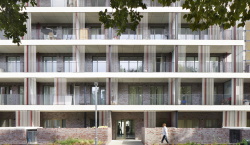Resilient London: Confronting Climate Change
7 October 2021
New London Architecture (NLA)'s 'Resilient London: Confronting Climate Change' has been launched, including exemplar projects and research carried out by us.
Despite the advancements towards the net zero agenda, climate adaptation strategies are still lagging behind, with a lack of understanding from the industry and ineffective policies at both local and central levels.
The just-launched report 'Resilient London' by NLA aims to raise awareness about the urgency to take action in tackling the impact of climate change. The research paper reviews the status of climate resilience strategies and action plans across the capital, the ability and skills the built environment sector needs for building and designing for a changing climate, and the barriers we face to implement effective resilience approaches in the capital.
We're proud to have contributed to the report with three exemplar projects and two pieces of research. You can download the full report here, and read about or contributions below:
Agar Grove Redevelopment
Agar Grove is a 507-home estate regeneration scheme in Camden, London. 80 per cent of the homes will be built to a Passivhaus standard, the largest development of its kind in the UK.
Comprehensive resident consultation has been central to the design. Construction has been carefully phased to allow most residents to remain on-site during the works, to maintain the community spirit into the new neighbourhood. All Phase 1a dwellings are dual aspect, enabling cross ventilation for effective natural cooling as temperatures increase. The communal MVHR system allows Camden to introduce air cooling in future, which could be powered by the on-site PV array.
We are the M&E / Sustainability Engineers and Passivhaus Consultants for this ongoing project.
Dulwich College – Junior and Lower School
The development at Dulwich College includes both new build and refurbishment elements, with a new library, ICT classrooms, wellbeing and admin facilities and hall connecting to exiting classrooms which are to be refurbished. From the outset, Dulwich College prioritised the sustainability aspirations of the project and have set the aspiration to be net zero carbon in both construction and operational energy.
The building does also include standard window openings, but these are intended to only be used to manage more extreme weather scenario, when occupants will be more than willing to trade some acoustic comfort for thermal comfort.
We were the M&E / Sustainability Engineers and Acoustic Consultants for this project.
Woodward Road
Woodward Road is a development of 56 affordable homes and 650 sqm of community space, designed for Be First. The residential development will be a mixture of low-rise typologies of three-storey mews houses and three to four storey apartment blocks. The project was designed to Stage 3 and is now under construction by a D&B contractor. Woodward Road has been designed to enhance residents’ comfort in hot summer spells, by incorporating several different shading devices to shade dwellings from hot sun.
We were the M&E / Sustainability Engineers for this project.
Design for sleep guidance
Our design for sleep guidance was developed to help future-proof new residential developments in London. As new homes are designed to minimise carbon emission they become more at risk of exacerbating overheating. Better insulation, airtightness and the inclusion of centralised heating and hot water networks increase the overheating risk. This guidance sets out zero carbon design measures that can be implemented to create comfortable sleeping conditions as summer temperatures in London rise.
This research was carried out by Henry Pelly, Senior Engineer and Partner at Max Fordham.
Greening cities
Greening Cities is about environmental, economic and social benefits brought about by increasing the amount of foliage, trees and soft landscaping within urban environments. Our MAX:R+I team examined the opportunities for green infrastructure to contribute to the economic, social and environmental wellbeing of urban developments.
The findings conclude that the implementation of sustainable urban drainage systems, such as green roof infrastructure, if installed evenly across 50 per cent of London’s rooftops would provide sufficient attenuation so as not to overload the current sewer network in a one in 100-year, 1-hour storm event. Green infrastructure can also help to reduce the Urban Heat Island (UHI) Effect.
This research was carried out by Hareth Pochee, Principal Engineer at Max Fordham, Neil Cogan, Senior Sustainability Consultant at Max Fordham, and Tom Greenhill, Senior Engineer and Partner at Max Fordham.






.jpg)